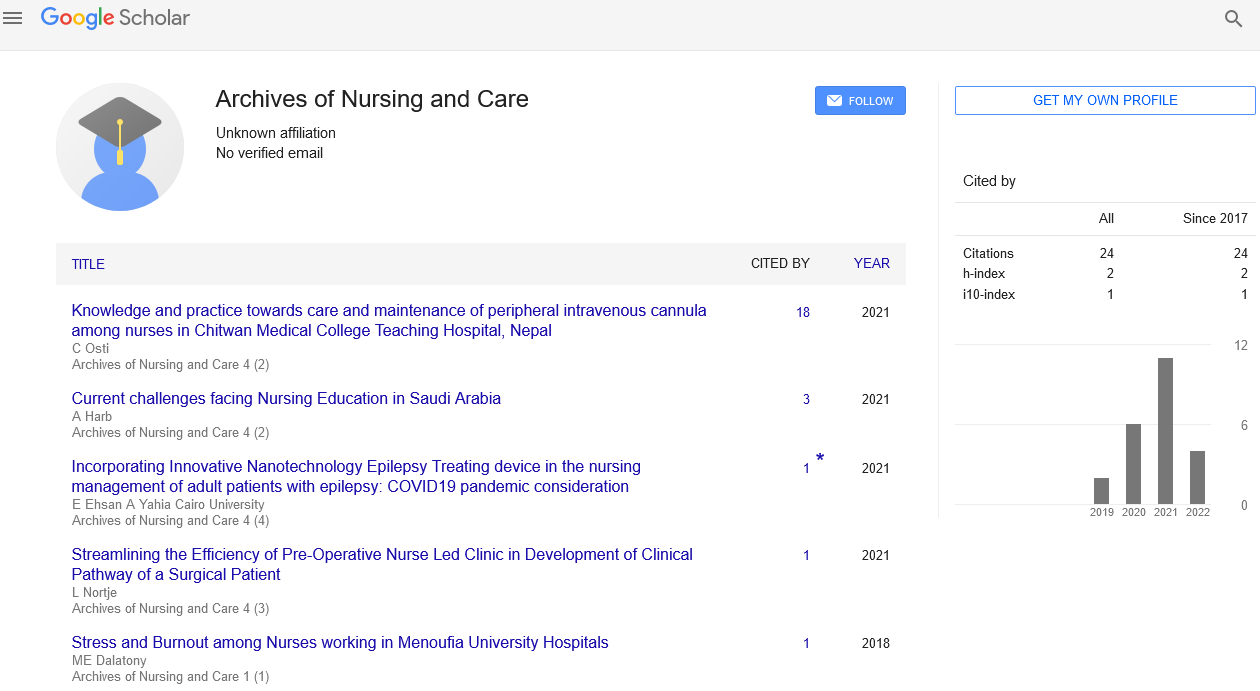Editorial - Archives of Nursing and Care (2023) Volume 6, Issue 2
Health care of Patient Satisfaction with Services Provided at Night and correlation between the assessment of Quality of Care in the Hospital
Osman Essam*
Institute of Nursing and Health Sciences, Faculty of Medicine, University of Rzeszow, Poland
Institute of Nursing and Health Sciences, Faculty of Medicine, University of Rzeszow, Poland
E-mail: OsmanEss@edu.ez.com
Received: 03-Apr-2023, Manuscript No. OANC-23-92212; Editor assigned: 05-Apr-2023, PreQC No. OANC-23- 92212 (PQ); Reviewed: 19-Apr-2023, QC No. OANC-23- 92212; Revised: 24- Apr-2023, Manuscript No. OANC-23- 92212 (R); Published: 28-Apr-2023, DOI: 10.37532/oanc.2023.6(2). 35-37
Abstract
Night nursing care has different priorities from the care in the morning and afternoon hours. The patient as the subject of nursing activities may assess the quality of this care in a more or less objective way, thus giving the opportunity to improve or improve these services. The correlation between the assessment of night-time care and the overall assessment of nursing care indicates statistically significant and significantly influenced assessment of the overall nursing care. The quality of the night tasks resulting from the therapeutic function and caring were considerably related to the overall assessment of the nursing care.
Keywords
Quality of care • Patient Nurse • Night shift •Nursing
Introduction
Nurse-patient relationship is one of the factors determining the patient’s satisfaction with the services provided. The conducted research indicates that nursing care is a basic indicator of satisfaction with comprehensive medical care. Few publications focus on the characteristics of nursing care provided to a patient at night, which requires the same supervision, control, support and dedication as during the day [1]. Concern for a good night’s sleep in a hospital is one of the basic conditions for recovery, and hence the quality of life. The optimal level of nursing care quality at night determines the diagnosis of all the bio-psycho-social-spiritual needs of the patient. Fulfilling expectations and accurately identifying the needs of the patient are therefore a guarantee of planning and providing care at the highest level [2]. An example of recognizing patients’ expectations at night during their stay in the hospital is the analysis of their level of satisfaction and the assessment of the quality of nursing services. The patients expect a sense of security and they want to trust the staff that looks after them. Therefore, the health care system must be based on integrity, respect and interest in the problems of the patients. The main aim of the paper was to establish the relationship between socio-demographic and other specific factors and the satisfaction of patients with services provided at night in Rzeszow clinical hospitals [3].
Health care constitute activities that meet the needs of society in the field of health promotion, prevention, treatment, diagnosis and rehabilitation. One of the determinants of the effectiveness of a health care provider in terms of healthcare is the quality factor [4]. In addition, it should give a sense of efficiency, effectiveness and security. The high quality of care should not only be organized in the best possible way, but have maximum human resources, medical and financial resources and infrastructure. The most import and the most commonly used measure of the quality of nursing care is the measurement of the level of patient satisfaction, i.e. its subjective assessment understood in terms of a sense of satisfaction with the received care or lack thereof. Analyzing available literature, you can find many publications on the evaluation and feelings of patients during hospitalization. A good indicator of the quality of nursing care is the examination of the level of satisfaction [5]. Due to the fact that each person has a specific ceiling and the scale of requirements and expectations, satisfaction is subjective individual impression. In their research, Otani and Kurz showed that nursing care had the greatest impact on the assessment of the patient's total satisfaction with the hospital stay. The quality of nursing care has a huge impact on the patient's opinion. A patient's care satisfaction survey strengthens his self-esteem, importance and importance throughout the entire healthcare system. Expectations towards medical staff focus on appropriate and professional treatment that is in line with global standards. The patient/client has the right to choose, ask questions, obtain optimal knowledge about the health condition, the proposed treatment methods, nursing. In addition, in medical entities covered by the accreditation system the staff expects the patient to assess the level of the care provided which is equally satisfactory from nurses health services and their own feelings. There are many factors hindering the work of nurses at night. Every effort should be made to make one of the components such as night nursing services a strong pillar of the health care system [6]. A patient's care satisfaction survey strengthens his self-esteem, importance and importance throughout the entire healthcare system. The patient has become an entity in the market of medical services. Patients expect a sense of security and want to trust the staff who will look after them. The healthcare system must therefore be based on integrity, respect and interest in the problems of the sick. Kelly emphasizes that "night nursing" is traditionally marginalized and treated as "Cinderella" services. Quite wrongly, due to, for example, professional liability issues [7,8].
Discussion
The aim of the study was to analyze the relationship between socio demographic and other factors and the assessment of health services provided by nurses at night in the opinion of hospitalized patients. The results of the research on quality of night care and factors influencing the opinion of patients and nurses were often similar to the results obtained [9]. Analyzing the results of scientific research, it was observed that between selected socio-demographic and other factors there was a correlation between levels of satisfaction and satisfaction with night care. According to our research, rural residents assessed the satisfaction of nursing care at night much better. The difference between the mean assessment in this domain between the residents of rural areas and cities was more than 12 points. Different results obtained Delura. All rural residents and 97.1% of people living in the city experienced satisfaction with nursing care. Different results obtained StanisÅawska, indicating lack of significant differences between education of the respondents and the experience of care [10].
Conclusion
The quality of services provided by nurses at night influences the overall assessment of the quality of medical services. At night, nurses provide well-being, peace and safety to hospitalized patients, and thus appropriate conditions for proper sleep and rest. Expectations of patients regarding the nursing staff are constantly increasing and are clearly articulated in the field of services provided at night. A comparison of information from the providers of nursing services and their recipients will allow obtaining objective results, assessing the level of nursing quality. The basic aspect of night care requires a lot of research that would adequately describe the reality of the nurse’s work in relation to the satisfaction of patients with the level of care provided at night. Improvement of working conditions and activities for broadly understood care of patients at night should be the main objective of the pro-quality direction of development of every medical institution, especially clinical one.
References
- Patrick DM, Marra F, Hutchinson Jet al.Per capita antibiotic consumption: How does a North American jurisdiction compare with Europe?Clin Infect Dis. 39, 11-17 (2004).
- Li WC.Occurrence, sources, and fate of pharmaceuticals aquaticenvironmentand soil. Environ Pollute.187, 193-201 (2014).
- Heberer T.Occurrence, fate, and removal of pharmaceutical residues in the aquatic environment: A review of recent research data.Toxicol Lett.131, 5-17 (2002).
- Banci L, Ciofi-Baffoni S, Tien M Ligninet al.Peroxidase-catalyzed oxidation of phenolic lignin oligomers.Biochemistry. 38, 3205-3210 (1999).
- Deblonde T, Cossu-Leguille C, Hartemann Pet al.Emerging pollutants in wastewater: A review of the literature.Int J HygEnviron Heal. 214, 442-448 (2011).
- Tavakoli M, Emadi Z.The Relationship between Health-Promoting Lifestyle, Mental Health, Coping Styles and Religious Orientation among Isfahan University Students.J Res Behave Sci. 13, 64-78 (2015).
- Norouzinia R, Aghabarari M, Kohan Met al.Health promotion behaviors and its correlation withanxietyand some students’demographic factors of Alborz University of Medical Sciences.Journal ofHealthPromotion Management. 2, 39-49 (2013).
- Pierce C.Health promoting behaviors of rural women with heart failure.Online Journal ofNursingandHealthCare. 5, 28-37 (2005).
- Hajizadeh Sharafabad F, Alizadeh M. Predictors of health-promoting behaviors in patients withcoronary artery diseasein the Iranian population.International Journal ofNursingPractice. 11, 164-176 (2016).
- Shahbaz A, Hemmati Maslakpak M.Relationship ofself-carebehaviors with hospital readmission in people with heart failure.CardiovascularNursingJournal. 6, 24-33 (2017).
Indexed at,Google Scholar ,Crossref
Indexed at,Google Scholar ,Crossref
Indexed at,Google Scholar ,Crossref
Indexed at,Google Scholar ,Crossref
Indexed at,Google Scholar ,Crossref
Indexed at,Google Scholar ,Crossref
Indexed at,Google Scholar ,Crossref

